
Whether in the time of crisis or peaceful period, people need to consume news of different types. Depending on individual preferences, business, politics, education, health among other news categories are available to audience every day from varied news media organisations. In some cases, these categories are being read, listened to or watched with the intent of being aware of happenings and events. To some people, benefit of consuming these news categories has been beyond just being informed of what is happening around them. Salient issues in the news are being used to make certain business and personal decisions.
Nexus between News Consumption and Economic Growth
Over the years, there are have been cases where news consumption influences economic performance positively and negatively. In the context of positive outcomes, several reports and academic publications have documented how media positive framing or coverage of economic issues and needs shaped Gross Domestic Product and other macroeconomic indices of countries positively because people and businesses reacted to the frames used to depict economic conditions by exploring opportunities and actions embedded in the news stories. It has also been established that the use of negative frames contributes to negative economic outcomes when people adopted the frames for decision making.
Register for Tekedia Mini-MBA edition 19 (Feb 9 – May 2, 2026): big discounts for early bird.
Tekedia AI in Business Masterclass opens registrations.
Join Tekedia Capital Syndicate and co-invest in great global startups.
Register for Tekedia AI Lab: From Technical Design to Deployment (next edition begins Jan 24 2026).
While these have been documented in academic publications and reports of several think-tank organisations, our analyst discovered that attention has not been paid to how nationalisation and foreignisation of news consumption affect Gross Domestic Product of a country. Like typical preference Africans usually have for foreign products and services, foreignisation is the consumption of foreign news content at the expense of the national news content.
In this piece, nationalisation of news consumption indicates Nigerians’ love of reading national issues and needs reported by online newspapers and broadcast stations that appropriate Internet-Broadcast media convergence strategy.
News Consumption Nationalisation, Foreignisation and GDP Growth or Dwindling
In its manner of reporting economic growth using different indicators, the National Bureau of Statistics reported some months ago that the country’s Gross Domestic Product grew by 4.03% (year-on-year) in real terms in the third quarter of 2021, representing a slower growth compared to 5.01% recorded in the previous quarter. On a quarter-on-quarter basis, real GDP grew by 11.07% in Q3 2021 compared to Q2 2021, reflecting a higher economic activity than the preceding quarter.
Since the news media reported various issues and needs across different news types, our analyst examines the connection of the types with the GDP growth in nominal and real terms from January to September. This is imperative because people, especially business and economic minded ones do utilize information reported by the media.
The use of nominal GDP is predicted on the fact that it tracks general changes in an economy’s value over time. This indicates the sum of all the final goods and services produced during a given period. The inclusion of real GDP is based on the premise that it considers inflation and accounts for the overall rise in price levels.
According to our analyst’s news consumption trend data, between January and November, 2021, a total of 2,834 foreign news reports were consumed by Nigerians, while 718 national news were consumed during the same period [see Exhibit 1]. From January to June, a significant difference in terms of consuming national and foreign news was noticed. In July, the data reveal that Nigerians still consumed foreign news report more but, not up to the volume consumed in the previous months. This trend was observed till August, 2021 before a wide spike in the difference was recorded again between September and November, 2021. These were analysed along with the GDP growth in real and nominal terms.
Exhibit 1: National versus foreign news consumption
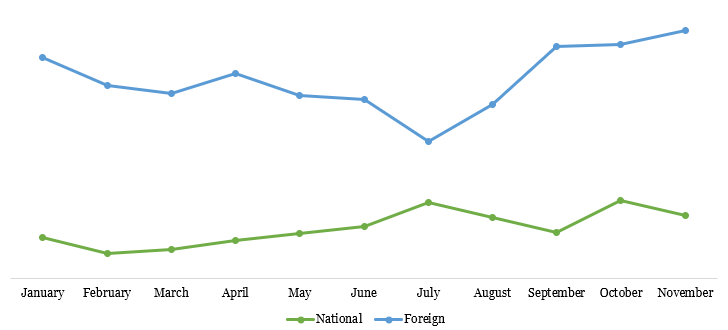
In our analysis of both national and foreign news content, some news categories associated with the two types of the GDP positively and negatively, suggesting possible good and bad outcomes on the economy. According to our analysis, reading lifestyle related news, which entails entertainment, music, arts and culture and other content that revealed the activities of prominent individuals and organisations in the country, connected with the two GDP types more than politics and health news reports [see Exhibit 2].
It is quite unfortunate that reading education news content and sports did not help the economy positively. Our analyst discovered that the more these news categories were consumed the more the two GDP categories suffered. One of the key factors that could be adduced to this is that in our data, a large number of sports and education news reports that were consumed were foreign content. Therefore, the negative outcomes on the GDP growth could be linked with non-use of the content for business decisions in Nigeria.
Exhibit 2: Nexus between GDP (nominal and real) and News categories consumed
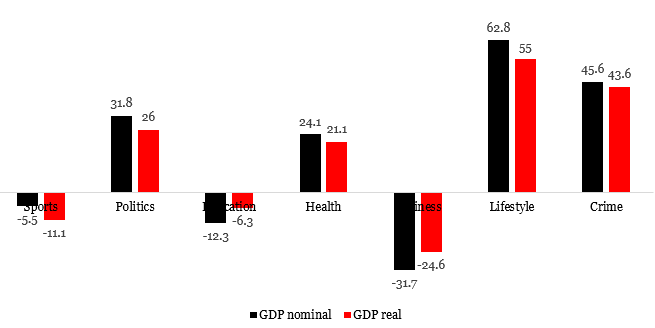
With the data presented in Exhibit 3, it is clear that nationalisation of news consumption delivers positive outcomes for the country. The negativity of the foreignisation of news consumption in the GDP is unsurprising because foreignisation of news consumption should only have impacts on the economies of the countries that featured in the news reports.
Exhibit 3: Connection between news consumption by geography and GDP indicators
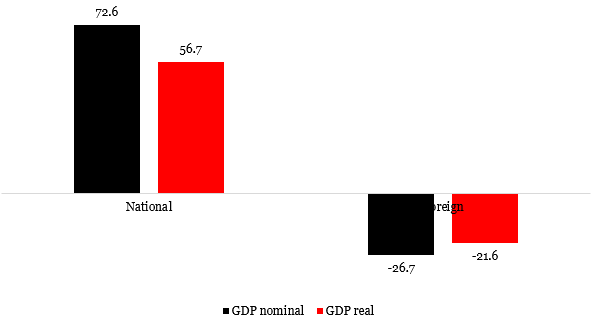
Across the news categories, different levels of explanation were found in the two GDP types. Similar to the earlier result, a large percent of the both nationalisation and foreignisation of consumption of lifestyle news category was found in the GDP nominal. This is closely followed by political related news, which has 68.3%. Consuming national sports related news reports seem to be significant to the economy because our analysis reveals 47.2% of its discovery in the GDP nominal. The 55.7% reduction in the GDP real suggests that despite foreignisation of sports related news reports, Nigerians failed to utilize the reports towards delivering positive outcomes for the economy.
Exhibit 4: Variation of news consumption in GDP nominal and real
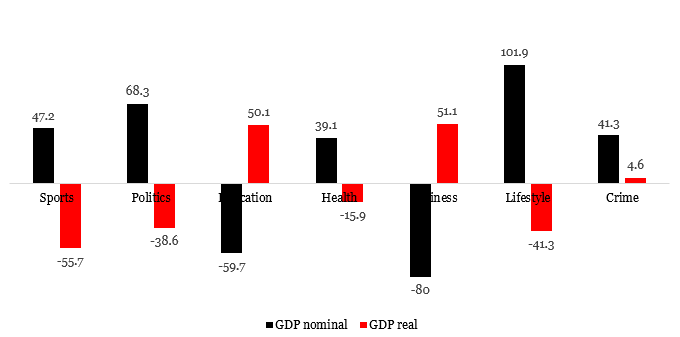
Geographical analysis of the news consumption reveals that nationalizing news consumption delivers a better and significant outcome on the economy. Over 100% of prioritizing consumption of national news reports were found in the GDP nominal while a significant reduction in the GDP real was also found [see Exhibit 5]. Surprisingly, about 40% of foreignizing news content was found in the GDP real while it made a negative contribution to the GDP nominal.
Exhibit 5: Variation of news consumption by geography in GDP indicators
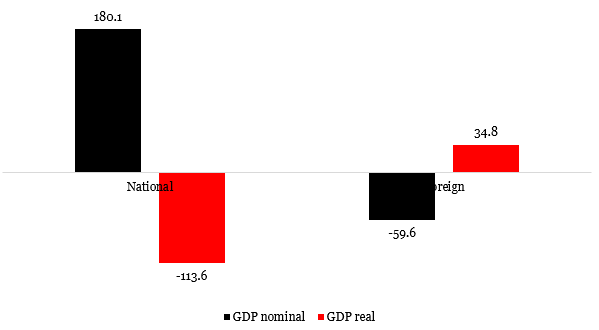
Strategic Options
The emerging insights have several implications for concerned stakeholders. For media organisations, there is a need for redesigning news content production and dissemination strategy. More attention needs to be paid to the reportage of national sporting events and happenings because it clearly established that foreign sports news reports failed to deliver significant value to the economy. Audience, especially the youth who use the Internet the most, should develop more interest in consuming national news reports and apply them while making business decisions. For instance, challenges or issues reported by the media organisations could be explored using strategy proposed by analyst in one of his previous articles.



